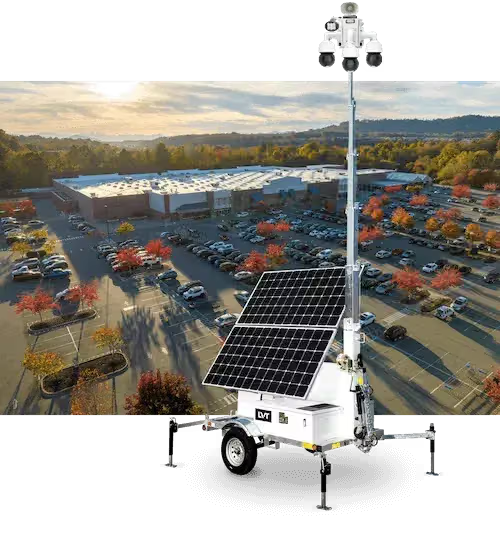Successfully Prosecuting ORC

Learn from a panel of retail AP leaders and Attorneys General on how key partnerships and collaboration are helping build the case against retail thieves, influence legislation, and strengthen security across the industry.
Featured Speakers

Matt Kelley
Matt joined LVT in 2022. Before this, he was Sr. Manager of Asset Protection Resources, Innovation, and Technology at The Home Depot, overseeing security and asset protection technology for all US stores. He served on the Loss Prevention Research Council's Advisory Board and led research projects. Matt holds a business administration degree from Georgia Southern University and an MBA from Georgia State University.

Eric Sterbis
Eric Sterbis is a senior attorney with the Michigan Attorney General’s Office Organized Retail Crime (FORCE) unit. With over 17 years of experience as an assistant prosecuting attorney, he has led high-profile units and targeted significant retail crimes. Eric holds degrees from Western Illinois University and the University of Detroit Mercy School of Law. He enjoys spending time with his family and running marathons.

Paul Jaeckle
Paul Jaeckle is the Vice President of Asset Protection and Safety at Meijer Stores, where he has served since 2017. With a background that includes 20 years at Walmart in leadership roles, Paul holds degrees from Western Illinois University and The Sage Colleges. He is highly active in industry and community organizations, including RILA, NRF, and LPF.

Sean Browne
Sean leads The Home Depot's Organized Retail Crime (ORC) strategy, overseeing a team of Managers and Investigators nationwide. He also heads The Home Depot's new Intelligence Unit. With over 12 years at the company in various asset protection roles, Sean is based in New York with his wife and two daughters. Outside of work, he trains and competes in Brazilian Jiu Jitsu.

Frank Patercity
Frank is Kroger’s Corporate Security Director, leading a team of investigators to combat Organized Retail Crime (ORC) and overseeing threat assessment, major crimes, active assailant response, and executive protection. With over 20 years of security experience, Frank previously held roles at Trane Technologies and Wells Fargo. A former Marine and Raleigh Police Department officer, he earned degrees in journalism and political science from Indiana University of Pennsylvania. Frank lives in the Cincinnati area with his family and enjoys reading and live music.
Fighting Back Against Organized Retail Crime
The rise of Organized Retail Crime (ORC) has become a significant concern for retailers worldwide, leading to substantial financial losses and increased security challenges. LVT offers cutting-edge solutions designed to prevent crime and safeguard retail businesses. By leveraging advanced surveillance technology, real-time monitoring, and data analytics, LVT helps retailers stay one step ahead of criminals.
- Deploy mobile surveillance units to monitor high-risk areas prone to ORC activities.
- Facilitate investigations with secure video sharing for seamless collaboration with law enforcement.
- Utilize talkdown capabilities to intervene during incidents
- Maintain 24/7 visibility with live streaming and advanced alert systems to detect and respond in real time
- Implement AI-driven automated escalation to deter organized retail criminals and prevent suspicious activities.

Full Transcript
Matt Kelley:
Good morning. I'm Matt Kelly with LiveView Technologies, where I'm the head of retail supporting the go-to market-teams. Welcome to our panel discussion on Proven Strategies to successfully prosecute organized retail crime. Back in February, LVT hosted a summit with investigative leaders from some of the top retailers in the country, multiple AGs offices and ORC task force leadership to share what's not working and best practices for collaborating across the public and private sector. Today we have some of those individuals joining us to bring those insights to you. We're focused on how increased collaboration and communication across both public and private sector is generating results for retailers across the country, and today's panel is a great representation of just that. I would like to turn it over to the panelists to introduce themselves. Eric, can you start?
Eric Sterbis:
Good afternoon. And thanks for the introduction, Mr. Kelly. Eric Sterbis, I'm an Assistant Attorney General at the Michigan Attorney General's office. I have been a prosecuting attorney for approximately 17 years. I spent my first 11 years at the Wayne County Prosecutor's office, which encompasses Detroit, Michigan. I then spent four years in the Macomb County Prosecutor's office and then was subsequently hired at the Michigan Attorney General's office a couple of years ago when we formed our newly formed one-of-a-kind unit called the Force Team, which is forces focused to organized retail crime enforcement. And over the past year, I have been one of the assistant attorney generals assigned to that force team. Thank you.
Matt Kelley:
Paul.
Paul Jaeckle:
Yes. Good afternoon. My name is Paul Jaeckle, Vice President of Asset Protection and Safety for Meijer Stores out of the Midwest based in Grand Rapids, Michigan. I have been part of the Meijer team for the last seven and a half years after a 20-year career with Walmart stores. I'm happy to be here with you guys today. Thanks, Matt.
Matt Kelley:
Frank, could I please ask you to introduce yourself?
Frank Patercity:
Sure. Yeah. And thanks for having me as part of this panel, Matt. I really appreciate the privilege of being here with this group of panelists. Like you said, my name is Frank Patercity. I lead corporate security, investigations and organized retail crime at Kroger. Essentially all things criminal matters for the company. Active assailant response, organized retail crime, threat assessment, management, executive protection. Major crimes fall to my team. Prior to joining retail a whole three years ago, if you can believe it, I've been three years now at Kroger, I spent a career between the Marine Corps Law Enforcement at a local level doing a variety of things and then made the move to corporate security in the private sector with some time at a major financial institution and a global industrial manufacturer.
Matt Kelley:
Sure. And Sean?
Sean Browne:
Yeah. Thanks for the invite and thanks for the opportunity, Matt. Sean Brown. I'm the senior manager of organized retail crime at the Home Depot. I've been with the organization about 12 years. I've been in the organized retail crime space now for a little over eight years, ranging from investigative roles up through leadership. Now I have the opportunity of leading the team of investigators, managers, and our intelligence hub out of our headquarters in Atlanta from coast to coast here. So I really appreciate and excited about today's conversation.
Matt Kelley:
Great. So let's just jump into the questions. And the first one is going to be combating ORC requires retailers, AGs offices, local law enforcement, federal agencies, solution providers, and many other groups to work together. Can each of you speak to the collaboration that your associates, groups, or task forces are a part of today and what's working and why?
Frank Patercity:
Yeah. First off, what a great question. The answer is within the question. It is those partnerships and it's those very groups that you mentioned, which are the key to success. For Kroger, for us, for my team, the organized retail crime managers who are out there fighting the good fight every day, making cases, working to disrupt these networks, it is about the partnerships. And that's one of the things that is a core tenant of our team and our values. It's the networking, it's the benchmarking, and it's the partnerships, and it's partnerships with other retailers too. Our CEO said it. There's no competition in tragedy. And when we have a major crime or a criminal enterprise that targets us in the organized retail crime arena, we know that it targets other retailers as well. It's not specific to Kroger.
So we partner frequently and leverage those task forces that are out there that you mentioned. So the attorneys general across the country, there's a handful of them. And if this was a quiz, I would probably fail, but I can't give you the exact number, but lots of them across the country where we utilize their resources. And the brilliant thing about them is these attorneys general have earmarked funds to establish these task forces and provide dedicated resources towards organized retail crime. And they help educate police officers, they provide detectives and task force members who are dedicated towards this because, look, I can tell you as a young cop, if it wasn't a gang member, if it wasn't a gun or it wasn't drugs, I didn't really care too much about it. I wanted to get after violent crime. I can remember an instance where I pulled over a car and a guy had hundreds of gift cards in his pockets and he's looking at me like he knows he is doing something wrong and I'm looking at him like I know he is doing something wrong, but I couldn't prove any of it because I didn't know, and I sent him on his way.
I may regret saying that in a session, but it's true and it happened. So I'm thankful for these attorneys general, these task forces that provide this education. I will say vendor partners who give us the resources that we need to identify and to help mitigate some of this stuff is always valuable. And lastly, the question itself around these organizations to which we partner with these organized retail crime associations that are across the country are invaluable because if you think about a specific part of the country where you've got an organized retail crime manager, if they're tied and plugged into their ORCAs for short, the acronym, if they're plugged into these ORCAs, they're hearing about what's going on with other retailers. They're hearing from law enforcement, they're hearing from district attorneys in some cases are part of these associations. So to steal a quote from my now twice retired boss, Mike Lamb, it's part of that ecosystem of all of these people that come together to fight to disrupt and dismantle these organized retail theft groups that are really plaguing us.
Matt Kelley:
Yeah. That's right.
Sean Browne:
Yeah. I think one of the best things that we've been able to do through these task forces is generate real collaboration. That has always been the name of excellent ORC investigations or building really strong relationships outside of our silos and our individual companies, but reaching out to other companies that are sometimes competitors and on the law enforcement side, engaging with the right partners in law enforcement. As retailers, sometimes we've spun our wheels in the past of engaging with agencies who didn't quite understand the scope that we face and the problems that we face as retailers. So the collaboration that we've been able to form through some of these task forces has been instrumental in our ability to grow our internal organizations in the way we approach these crimes, but also just gives us this ability to constantly bounce ideas off of leaders in the industry.
We're competitors in every sense that you could imagine, but when it comes to trying to combat these types of crimes and the way that our stores are impacted, our associates, our customers inside of the stores, we all band together and it really builds these awesome relationships, something that we've attempted to replicate across the country, including places like Michigan where we've had great success. We use it as a template to go to other states and show what success can really look like.
Matt Kelley:
Thanks, Sean. And Eric, what's working for you guys at the Michigan AG's level with these task force?
Eric Sterbis:
Well, it may sound simple and straightforward, but the creation of a team, our force team, which is unique in the sense. Attorney General Nessel realized that there was an important need to have a unit dedicated to combat the ever-growing scourge of organized retail crime that is not only in Michigan but across the country, but also the fact that we have a team dedicated to do exactly that. Not many other states can say that. And one thing that our team is focused on for the longest time, these types of crimes simply didn't have a home. Organized retail crime is multi-jurisdictional. It just doesn't happen in one city or one county. These groups jump around from county to county to county across the state. There's been no prosecuting agency that has really been equipped to handle these types of cases. So that's the need for a unit such as the Attorney General's office to take on this responsibility focused on organized retail crime. And we began developing from day one relationships with retailers such as Home Depot and Meijer. And just in our first 12 months of operation, we could speak to just a number of successes that we've had working with retailers to combat organized retail crime.
Matt Kelley:
Sure. And Paul, can you speak to what's working for you guys at Meijer and some of the cross-functional groups you're working with internally and externally as well?
Paul Jaeckle:
Yeah. Thanks Matt. For us, historically this has been a bit of a grassroots mechanism of working with state ORCA organizations or trying to collaborate locally with individual retailers, but I think we've all learned pretty clearly that when you're dealing with these criminals, they're agnostic to the retailer of choice. And so being able to have this degree of collaboration makes it a bit easier to be able to navigate it. For us, as we've watched this arena of organized retail crime become one of the fastest growing areas of loss for retailers to combat, it's forced us to maybe think about it a little bit differently beyond just the investigative aspect of it. And for us, that really meant that it's bringing in a holistic group of people, both internal to our organization, but also where we have relationships outside of it. So for instance, our government affairs and legislative team has been extremely instrumental for us of being able to help advocate for a lot of the need to create education really within the legislative space.
For those that might not necessarily be familiar with what we're actually talking about, we're thinking that organized retail crime is the same thing as general shoplifting and it's not and shouldn't it be prosecuted or investigated as such. So that has been a real game changer for us to be able to really educate and think differently about putting some teeth behind this that as the cases are identified and developed, that they're actually prosecuted appropriately. I think the secondary aspect of it is in relation to our solution providers. Being able to create strong, thorough investigations that have the evidence to make it easier for the task forces, the AG's office, or any of the prosecutors that are involved with this, really understand exactly what is happening and giving them a solid case that really candidly expedites the ability for them to maneuver it through the judicial system has been extremely beneficial not just for us as a retailer, but I think also for those parties that ultimately are responsible for moving that all the way through to disposition.
So it's a continual evolution I think for us specifically. I know we're talking a little bit about Michigan today and Assistant attorney General Sterbis has said it as well. Michigan has been a little bit on the cutting edge of thinking about this differently and putting in a bit of a best in class task force to really drive the enforcement that we're now starting to see several other states model against for how they're trying to maneuver that within their individual states.
Matt Kelley:
Sure. Thanks, Paul. And Eric, this question is for you. And this kind of dovetails with Paul's answer there. Give us the backstory on how Michigan got involved and funded their task force. And maybe if you could give us a perspective on the ORC initiatives they're focused on and how this audience can support you and other state AGs.
Eric Sterbis:
Well, we were funded by the state legislature for a three-year term that began at the beginning of last year in 2023 and I believe ends at the end of 2025. So obviously Attorney General Nessel saw a need for us to exist. And the fact that we were created out of that need is something that we're focused and here to do. Something that working with retailers that I think can help both of us work together in combating this issue is number one, communication. We have to, number one, let them know that we exist, and number two, they have to let us know what's going on in the stores. Organized retail crime in general is typically a crime that happens within the four corners of the store. This isn't a crime that is typically observed by your patrol officers riding down the street. So that communication with retailers, by having them inform us what is a problem in a situation occurring within their store is critical for our unit to continue to have success, combat organized retail crime in our state, and obviously help the store rid itself of a problem. So that's one part of it.
I think the second part is that I think for the longest time stores may have been apprehensive to call law enforcement to come to their store not knowing how that kind of relationship would work. Would the store and its customers get upset and nervous seeing kind of an enhanced law enforcement presence within their store? What would that even look like? Would there be arrests made in their store? I think there was a lot of apprehension and anxiety between law enforcement and retailers for the longest time about how best to handle this issue from an enforcement perspective. But one thing I can say is that prosecution and investigation of these types of crimes more often than not can be handled and performed remotely by way of surveillance systems and reports that can all be kind of forwarded to us without any law enforcement ever needing to step foot in the store at all. So it's very crucial to have communication, develop relationships, not only with our office, but our office and all the retailers within our state so they can feel comfortable and confident in knowing how an investigation can play out so we can kind of begin to build a better relationship working together to solve this issue.
Matt Kelley:
I appreciate that, Eric. And this is for each one of the panelists. As the retailers are on the front lines of ORC, how are you partnering with AG's offices and other regional or local entities that are new and making a difference? Paul, what's your perspective on that?
Paul Jaeckle:
I don't know that there's a single silver bullet here. And we've talked a little bit about this on just the general need for collaboration. I think that that is an ongoing aspect here, whether it be in terms of many of the states have ORC boards that are working collaboratively. And I think as many of us know, and get into this space even deeper, the commonality of the offenders are pretty common. Those that we're having issues with are the same that are impacting Home Depot, or the Krogers, or Walmarts of the world as well. And so just being able to consolidate really what do we know about it, where are we having opportunities, and ultimately trying to identify exactly the full details of those cases has been extremely helpful. I think the other aspect of it is really being able to make sure that we have great relationships, not just with our law enforcement partners, but also with the prosecutor's offices or the task forces.
Not every individual state has a specific task force per se, but it may be aligned that you have individual groups within either municipality, law enforcement, or with individual district attorneys that they've established some teams to be really out there and robust on organized retail crime. All of those things ultimately matter to get the right people at the table and having those conversations of trends that we're seeing common offenders, modes of theft that are happening, origination of where the crimes are happening at, getting all that stuff scored away. I think the last aspect of it is the continuation of what this evolution looks like. We've oftentimes talked about the fact that thieves, especially in this place, are oftentimes like water finding the path of least resistance. And so there's not really a finish line for us in this particular space, and it's the continual evolution that as the criminal elements start to move based off of how theft is happening, where it's being sold, who is being targeted, why it's being targeted. The continuation of understanding those dynamics and sharing that intel has been absolutely critical and I think is going to continue to remain so if we really want to take on this war the right way.
Matt Kelley:
Yeah. That's right. So coming to you with this question as well, Frank. As the retailers that are on the front lines of ORC, how are you partnering with AGs and other regional and local entities that are new in making a difference?
Frank Patercity:
Yeah. It's another good question. And we're giving them whatever support they need, be it partnerships and investigations. We're providing them with all that they need to make the case to build these programs. Anytime one of our organized retail crime managers comes to us in leadership and says, "Hey, I've got this attorney general's office, there's an investigator there that's really interested in organized retail crime. They want some support." We make sure we provide that. We voice our support to the attorney general to help build this partnership. We utilize government affairs, we utilize our partners internally to help make those connections and stress the importance of this because this isn't something that just affects us. It affects all of us, and I mean all of us. I mean, every one of us in America. Not just the retailer, but the customer, the consumer, the people who are going to the store to buy the goods, expect them to be there. So we stress all of that and really work together with these attorneys general to build these task forces. I'm so very thankful to see so many of them coming online. Folks like Eric that are out there and they're hungry for building these programs and these teams, we're on board with that and we want to get next to them and work with them to build them.
Matt Kelley:
Perfect. And Sean, so how is Home Depot partnering with those agencies, both the AG's office and the local ... maybe even regional law enforcement groups to combat ORC?
Sean Browne:
Yeah. I think it's really important to keep in mind that there isn't a singular entity that's going to solve every problem, solve every case. So you need to keep your eggs in a few different baskets. What my advice would be to my retail peers, and I urge my retail peers when I have conversations with them, we're still in the infancy of task forces as it relates to organized retail crime. Be a part of them, engage in them, go to your senior leadership teams, ensure that you can place resources in the right parts of the country to support these new expanding agencies and task forces. Not only are you going to succeed as a retailer and you're going to see the cost benefit from it in the way you operate your business, what you're also going to begin to see is these agencies task forces are going to be able to operate at a much higher level because they're going to have your support. When we've made decisions at Home Depot to place resources directly with task forces, we've seen tremendous results that honestly we haven't been able to replicate in places that don't have these task forces in this level of support. So that's the first thing that I would urge the retailers to take this seriously.
We've expanded a lot of task forces to a lot of different states, but we're still relatively new. So as it continues to expand, make sure you're having those conversations. The second part of the conversations with the attorney generals themselves and some other higher level leadership on the public sector side is express the issues to them in clear ways that they can understand. Leverage the data and the tools that you have. Don't hide your secrets, bring that information to them. They're really receptive. They've been able to support in a lot of great ways from the INFORM Act to iterations on the INFORM Act already. If we can drive the support of these issues in organized retail crime as a whole, the advocacy pays dividends to all of us. This isn't an individualized effort here. It's not like Home Depot comes to the table and just Home Depot benefits. All the retailers are going to see cascading downstream benefits to all the work and the advocacy that we do.
So I urge you, if you have government relations, if you have public affairs, partner with them. If you don't, you have to be that advocate yourself and make sure that you're setting up time and engaging in these spaces. Use your retail organizations to help drive these conversations and put you at the table with the right individuals in these states. And if you have issues in states that don't have task forces or haven't had receptive AGs, reach out to your peer retailers and see what kind of resources have they tried to throw at it. If we collaborate in this effort, we're really able to move mountains. And we've seen that in Michigan and Utah. The things that California Highway Patrol are doing are just spectacular.
Matt Kelley:
So as we conclude, I want to thank each one of the panelists, both Eric at the AG's office, Sean, and Paul from the retailer's perspective. We'll open it up to questions now.

Test Out the Best Security Strategy
We offer a free consultation and a custom end-to-end security strategy for your unique situation. Connect with an LVT specialist to see if you qualify for a risk-free trial.
